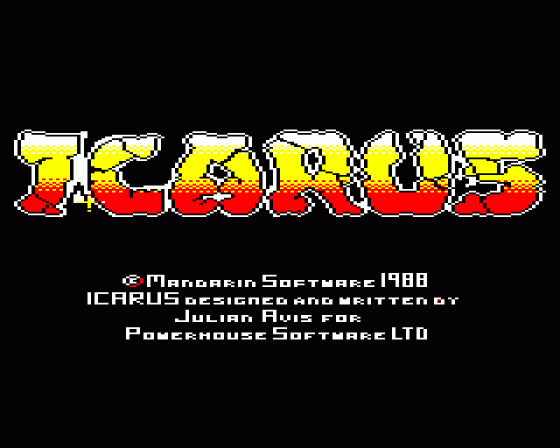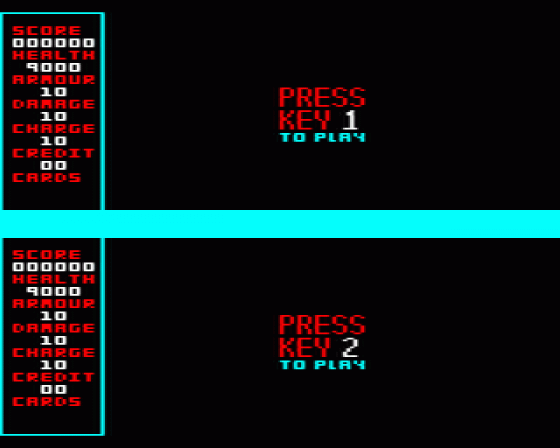The 'top end' of BBC and Electron releases were presented with a lot more panache than earlier outings, and Icarus is a case in point. A 1988 game by revered author Julian Avis, it is a two-player overhead-maze game. Think of the ambiance of Star Drifter with a split-screen, if you will. It is done in 100% machine code, in full colour Mode 5 and it comes with a (literally) twinkling loading screen featuring the game's logo. The original tape release was (ugh!) multi-load, with each 'deck' of the spaceship being loaded in as the previous deck was completed. Thankfully the disc version reduces what were 2-3 minute waits to about half a second (Indeed, if playing via emulation you won't even know it's happening!).
The premise is that Starship Icarus has been taken over by the half-cousin of Hal from the 2001 film and he has directed it to fly directly into the sun. Now I personally do not see why this is such a huge problem. Flying into the sun presumably means said spaceship would explode in a large burning mass of flames leaving both its super-computer, and its entourage of minion nasties, nothing more than burnt toast crumbs. I presume therefore that we are on a political mission and that 'the powers that be' want their starship back intact, rather than a humanitarian one. Certainly there are no hostages on board for us to rescue.
The big selling point of Icarus is its split-screen two player feature. There are relatively few two player games for the BBC/Electron (which is, I think, one of the reasons the computers are not as fondly remembered as others) and the publishers, Mandarin Software, were out to capitalise on this, big time. "Now two can play - and experience - the challenge of a lifetime!" cries the inlay. To be fair to them, the feature is extremely impressive. There is no requirement for two players to be involved in the action; one player can go it alone. But the game really livens up when a friend is involved.
The decks which comprise the spaceship are intricately designed, consisting of, amongst other things, keycards, doors, roaming nasties, computers and lifts. The first deck is relatively easy to complete (I completed it on my first attempt!), but the difficulty is soon ramped up on level two. The ability of a player to join in the action 'at any time' is an interesting one. You can almost, for example, extend your energy by 100% by playing as player one until you are at death's door - then hitting 2 to teleport player two into the level and then continuing the game as him. Almost is the operative word however because progress in the game is made by collecting keys.
Progress is made as follows: Firstly, you explore the surrounding area. Secondly, you discover a key numbered 1 to 5. Once you collect this key, you can open doors of the same number on that one deck (Once you proceed to a further deck, you lose all your keys and start from scratch). You cannot drop keys; when you run over them they become part of your spacesuit. The strategy of playing as player one until near-death and then taking over as player two therefore is fraught with this problem. If player one has already collected keys necessary to freely roam essential areas, he takes them with him to his grave hence they are no longer lying around for player two to collect!
If you play alongside a friend, then teamwork is essential. Often player one will end up with keys 1, 2 and 5 (for example) and player two with 3 and 4. In order to get through doorways, one player can hold the door open whilst the other walks 'through' him.
Now for the action itself. There are nasties galore patrolling the space station, all firing lasers and all quite deadly to the touch. Each player has a single life with an energy bar - the bar is depleted by contact with anything that moves, and replenished by collecting 'credits' (little red dots) and then cashing these in at vending machines. You soon get the hang of this.
Strategic play is required, in that as you blast away one nasty, another one is teleported in affording little chance for progress. Instead you should aim to destroy the actual teleportation lift device first. This will prevent reinforcements from appearing but will often call for you to run the gauntlet of enemy fire in order to reach it successfully. You can pick off enemies with a barrage of fire and follow this up by hiding behind the key-activated doors (which automatically close as soon as you move away from them) or hiding behind moveable walls (red box-like sprites) when they retaliate.
One of the most surprising aspects of Icarus is that enemy fire cannot be avoided from running from one room to another. Indeed, if a nasty fires towards you in the room next door, its bullets will come whizzing into your current room with no warning whatsoever! I have to admit a sneaky regard for this feature simply due to the fact that to be able to achieve this, the programming must evidently be keeping tabs on the location of every single moving entity, good or bad, in the entire current deck. This is the sign of a true quality piece of software.
This is not to say however that the game cannot be criticised. It is difficult (not impossible, but difficult) and there are complexities to playing it that need to be almost studied before commencing a game. Go in blasting and hope for the best is, like Exile, a terrible battle plan here. The fact bullets follow you from room to room may be a brilliant piece of coding but it is also extremely unexpected, even for hardened games players - and could be extremely irritating to many. Finally, there is an extreme amount of fluxation when many nasties are on screen at once. The little Electron just doesn't have the processing power to cope with so much mayhem; you either need to crank up the speed on your emulator or fire up your Slogger Turbo board on the real thing not to feel frustrated when it slows to a sudden crawl.
Sadly, Icarus was not particularly well-received on its release with reviewers calling it a competent piece of programming but, alas, not up to the hype of the Mandarin Software marketting department. My own opinion is that this really did miss the point in a big way. Icarus is, to my mind, exactly the type of game which at least the Electron market was screaming out for... It's got parallel game-play, a huge and complex puzzle to solve, great graphics, good sound and enduring lastability. My feeling is that Julian Avis intended it to be a disc-only release, and to really show off his programming skills. However, because of the problems with supplying software for the Electron on that format, Mandarin of course released it on tape. Multi-load levels (all twenty of them) could not help but negatively impact its perception. However, now it's available on disc, it really is in a class of its own, and is without equal. You won't be glued to it for the rest of your life, but you'll find slick and definitely a 'top end' Electron product.
Other Reviews Of Icarus For The BBC/Electron
Icarus (Mandarin)
A review by Jon Revis (Electron User)
Icarus (Mandarin)
A review by Dave Reeder (A&B Computing)
Icarus (Mandarin)
Double date with death
Icarus (Mandarin)
Keep Out Of The Sun


 30th October 2010
30th October 2010










